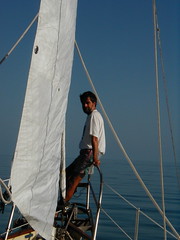Because my previous project (“Rebuilding our Volvo MD 11D engine”) was put on hold due to weather (it is still cold here in Kingston, Ontario, Canada!), I decided to get going on another job: our dinghy cover.
For our previous dinghy we had created a dinghy cover made out of Sunbrella it. And it did a great job. Not only did it protect our dinghy skin from sunlight (important, because we had a PVC skin), but almost as importantly: it protected the dinghy topside while climbing in and out, or sliding all kinds of things into the dinghy, or attaching it to run-down docksides, pilings, concrete walls – any cruiser will know what I am talking about. In all of these cases, the cover took the brunt of abuse, while the PVC skin underneath looked like new.
We missed this protection on our recently purchased Zodiac while sailing last year and promised our “Zoom” that it will get one soon!
Since only the very topsides will see damage from sun and traffic, that is were the the sunbrella cover will be located.
In a first step, I glued 1” of Velcro (I glued the loop side) along the tube shell. I used 1 part Flexible Plastic contact cement (LePage) and applied the glue with a small stiff brush (2 coats recommended).
Next, and this is the tedious part, I placed templates across and along the tubing, and create sections where the tubing follows a bend or is rounded off and made cutouts where needed. And there is no guarantee that the template from one side will match the other side – most of the time, it does not.
I then removed the largest sections and transferred the template outline to the sunbrella material with a pencil. For cutting, I use a soldering pistol with a bladed tip which I had sharpened a bit to minimize cutting width and burning. After cutting, I sew on the Velcro stripes and mount the sunbrella for confirmation, before I continue with the next section. This way, I work myself forward to the bow.
The bow sections consists of three parts which I attach to each other with Velcro. In the past, I did sew all of these pieces together – so there was only one piece of material - but found when I had to re-mount the cover, I was struggling to get it in the right place all around the dinghy. This time I decided to have the long tubes as one section each, and the 3 bow sections attached with Velcro. Much easier to assemble and disassemble, especially if one wants to make a small repair. The picture shows two of the sections mounted on the dinghy.
Within 2 days I had the cover completed. I still have to attach the grab lines, but that’s it!
Now, if we could have spring, please!!! So that I can continue with the engine. I am getting restless!







No comments:
Post a Comment